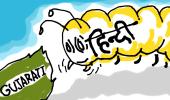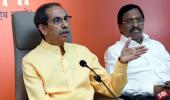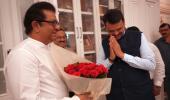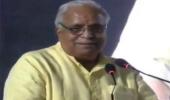'We already understand Hindi -- through Bollywood, TV, pop culture.'
'But we never forced it on ourselves.'
'When something is imposed, the joy and organic nature of learning disappears.'

In the second part of this thought-provoking conversation with Prasanna D Zore/Rediff, poet Hemant Divate explains why the imposition of Hindi on young students in Maharashtra is not just an educational burden, but a cultural crisis. (this interview was conducted before the Maharashtra government withdrew its order on teaching Hindi to school children from Class 1 onwards)
In a bold act of protest, Divate returned the prestigious Maharashtra Keshavsut Literary Award along with the Rs 1 lakh cash prize he received in 2021 from the Maha Vikas Aghadi government led by then chief minister Uddhav Balasaheb Thackeray.
- Part 1 of the interview: 'You Can't Make Children Your Laboratory For Political Experiments'
By returning the Maharashtra Keshavsut Literary Award and the cash of Rs 1 lakh that comes along with it you've made a powerful symbolic gesture. But do you see this as the beginning of a larger movement -- legal challenges, public campaigns?
I've done what I could do -- as a poet and a writer. I'm not an activist. But if other writers, artists, journalists, or organisations feel the same way, then they can take it forward. I've taken my stand publicly.
If people believe this policy must be reversed, they should come together and pressure the government.
Mi majha kharicha vata dilay (I have done my bit by returning the award and cash).
You mentioned the policy imposes Hindi on children who already speak a dialect of Marathi at home, especially in rural areas, and study Marathi and English in school. How does this affect their learning?
In many rural areas, children don't speak standard Marathi at home -- they speak dialects. In school, they are expected to learn standard Marathi, then English, and now Hindi as well. For them, Hindi is the fourth language. That's completely unfair.
They'll be forced to abandon their dialect, fail to grasp standard Marathi properly, struggle with English, and then be expected to learn Hindi too. This will confuse and alienate them from all languages -- including their own.
But the scripts for Hindi and Marathi are similar. Wouldn't that help?
No -- it makes it worse. Because the scripts are similar, children confuse the languages. For instance, my daughter couldn't pronounce 'Dnyan' (ज्ञान) correctly -- she said 'Gyaan' (ज्ञान) like in Hindi (Marathi (ज्ञान) and Hindi (ज्ञान) are written exactly alike because of the Devnagari script but in Marathi it is pronounced as 'Dnyan' and in Hindi 'Gyaan').
This was in an urban ICSE school that introduced Hindi from Class 3. If this is the case in Mumbai, what will happen in rural Maharashtra?
Do you think this is a political move?
Yes, I believe this is political, not educational. I heard the chief minister say, 'Hindi is a good language and everyone should know it.' But that's not the point.
We already understand Hindi -- through Bollywood, TV, pop culture. Even people in South India understand Hindi. But we never forced it on ourselves. When something is imposed, the joy and organic nature of learning disappears.
Many Maharashtrians are fluent Hindi speakers. They appreciate Hindi literature. Why, then, is its mandatory inclusion a threat?
I am not against Hindi. I am against linguistic centralisation. When a language is imposed, it flattens everything around it.
Look at cities like Hong Kong or Mumbai. They all look the same now -- glass façades, high-rises, no character. Architecture has become monotonous. We're doing the same to language and culture.
When the world becomes too flat, everything becomes boring -- depressingly monotonous. I've written poetry about this. It's cultural erasure in the name of progress.
Are you saying the idea of 'One Nation, One Language' is like a form of flattening?
Exactly. Uniformity kills diversity. If all cities look the same, if all schools teach the same language compulsorily, we'll soon forget why we were unique in the first place.
Languages are tied to identity, history, creative expression. What makes India special is our many languages and cultures. That's what makes us interesting -- not everyone speaking the same tongue.
You've said urban India is too distracted to notice this. Why?
People in Mumbai, Pune, and across urban India are just struggling to survive. They're not living full lives -- they're running from one thing to another. There's no time to protest, to reflect.
So even though people in Maharashtra and in other states like Karnataka and Tamil Nadu are agitating, the media doesn't show it, and urban people don't engage with it.










